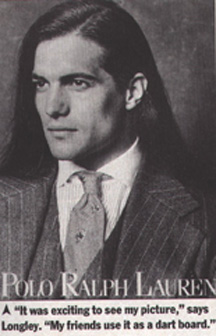A MODEL ADVOCATE
Mitch Longley Acts Up
Human Rights
Speaking Out for the Disabled
From: Elle Magazine, March 1992
Story by: Karen Brailsford
 When magazine readers turn to the Ralph Lauren ad featuring a
black-and-white close-up of Mitch Longley's striking profile, they tend to over look the
designer's gray striped suit. Instead, they linger over Longley's perfectly sculpted face,
his shoulder-length, jet-black hair, his sensuous dark eyes. When magazine readers turn to the Ralph Lauren ad featuring a
black-and-white close-up of Mitch Longley's striking profile, they tend to over look the
designer's gray striped suit. Instead, they linger over Longley's perfectly sculpted face,
his shoulder-length, jet-black hair, his sensuous dark eyes.
When he meets people in person, however, he rarely generates such an idolatrous response.
"Usually, people don't want to look me in the eye," says the 26-year-old
paraplegic actor and activist. "I make them feel uncomfortable." Yet Longley's
two current projects - he appears on the television soap Another World as lawyer Byron
Pierce, and heads SOWOHO, a small, nonprofit advocacy organization for the disabled - are
helping to ease the discomfort many often feel at the sight of a wheelchair.
Longley coined the word "SOWOHO," a condensation of the phrase "spirit of
the wounded horse," in homage to Native Americans. (There is Indian ancestry in his
family.) "I see the disabled as wounded horses, because horses are very beautiful,
intelligent animals," explains Longley, "but when they get hurt ... well, you
know what you do to an injured horse. Instead of shooting us by way of anxiety or
fear," he admonishes, "help us to become what we're capable of becoming."
SOWOHO represents Longley's personal campaign to do just that. In 1990, a year after
graduating from Northeastern University, he spent two months in Egypt doing research on
the disabled, at the invitation of Denis Sullivan, his former professor who was there on a
Fulbright Scholarship. (Sullivan now serves as SOWOHO's director of research.) Longley
also lectured at the American University in Cairo, a skill he perfected as an
undergraduate, when he would give talks at Northeastern and other Boston colleges about
the handicapped.
Ultimately, Longley would like SOWOHO to consult with hospitals throughout the Third
World, helping to implement services for newly disabled people, training health care
workers, and working to change prevailing prejudices. When compared with developing
countries, says Longley, the United States is "more advanced technically. We have the
sophisticated laws. We have the accessible buildings. But this country still has major
fears in dealing with disabled people. I think it is because our culture is so shallow, so
young. It's such a white, male place. When I went to Egypt, no one stared at my
wheelchair. They looked right at my face. Unfortunately, we haven't developed enough to
treat people who are different as equal."
 Longley, 26, was paralyzed below the waist a few months before his high
school graduation, in 1983. After drinking a few beers with friends, he fell asleep at the
wheel and crashed into a stone wall near his family's home in Rowayton, Connecticut.
"My two room-mates in the hospital were both paralyzed from the neck down. Yet here I
was, able to get out of bed by myself, comb my hair, and eat without dropping my peas into
my lap. Suddenly, I thought, Man, am I lucky! And I soon began to move my hips." Longley, 26, was paralyzed below the waist a few months before his high
school graduation, in 1983. After drinking a few beers with friends, he fell asleep at the
wheel and crashed into a stone wall near his family's home in Rowayton, Connecticut.
"My two room-mates in the hospital were both paralyzed from the neck down. Yet here I
was, able to get out of bed by myself, comb my hair, and eat without dropping my peas into
my lap. Suddenly, I thought, Man, am I lucky! And I soon began to move my hips."
After three months of therapy, and with the help of braces, Longley was able to walk down
the aisle at his high school graduation ceremony. In the nine years since the accident,
Longley has gradually gained more sensation in his legs, much to the amazement of his
doctors. He swims, practices yoga, and plays tennis on the National Wheelchair Foundation
circuit.
After a stint in 1989 working with disabled kids in California, Longley returned to the
East Coast and took a publishing job in New York City. He serendipitously landed the Ralph
Lauren modeling session after a friend showed pictures of Longley to Bruce Weber. Although
Longley recently did another shoot for the designer, he has decided to devote most of his
time to SOWOHO and to his acting career.
"I think good things can come from acting," says Longley, who applauds the
convincing performances of actors playing disabled characters (such as the one in Coming
Home, for which Jon Voight won an Oscar). But he believes that having disabled actors
play these roles will prove even more effective in changing people's attitudes about the
handicapped. He says confidently: "Whole perceptions of disabled people can be
changed with one love scene between an actual disabled actor and a Mariel Hemingway or a
Michelle Pfeiffer."
Back to Articles |